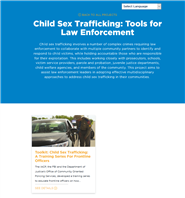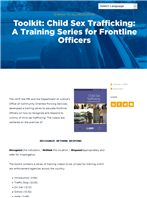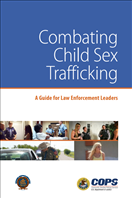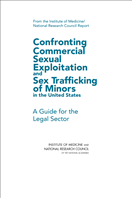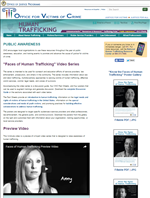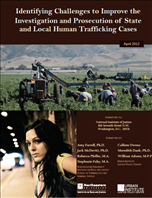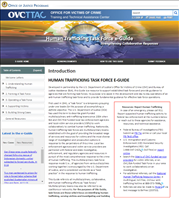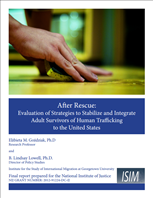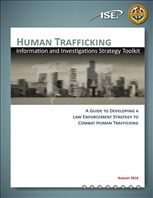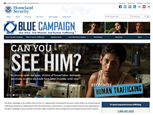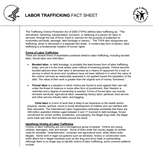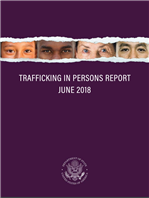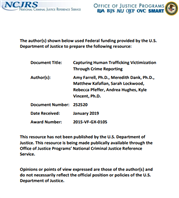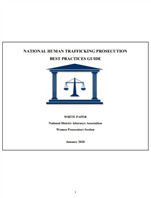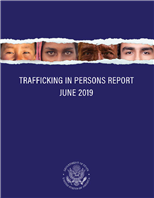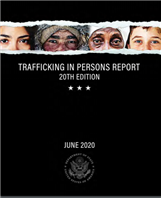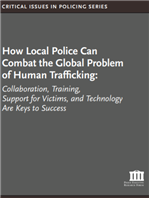Aequitas Training and Technical Assistance
AEquitas offers training related to the investigation and prosecution of gender-based violence and human trafficking. We work alongside our multidisciplinary partners to continuously expand our course offerings. All training events are tuition-free, and scholarships may be available to help offset the cost of travel-related expenses.
Child Sex Trafficking Toolkit for Law Enforcement
The IACP, the FBI and the Department of Justice's Office of Community Oriented Policing Services, developed a training series to educate frontline officers on how to recognize and respond to victims of child sex trafficking.
Child Sex Trafficking: A Training Series for Frontline Officers
Child Sex Trafficking: A Training Series for Frontline Officers is a toolkit developed by the International Association of Chiefs of Police in partnership with the FBI and the COPS Office. It includes a series of training videos to be used for training within law enforcement agencies across the country, a discussion guide meant to reinforce key information contained in the videos and to assist officers in applying this knowledge to their role as first responders in their community, and quick reference sheets to supplement the videos and discussion guide.
Combating Child Sex Trafficking: A Guide for Law Enforcement Leaders
Child sex trafficking involves a number of crimes requiring law enforcement to collaborate with multiple partners to identify and respond to the child victims while holding accountable those who are responsible for their exploitation. Combating this crime requires working with prosecutors, schools, victim service providers, parole officers, child welfare agencies, community members, and others. This guide aims to help law enforcement leaders adopt effective multidisciplinary approaches to address this crime and provides tips on training, identifying resources, and engaging communities. This guide also includes descriptions of effective programs in five law enforcement jurisdictions.
Confronting Commercial Sexual Exploitation and Sex Trafficking of Minors in the United States: A Guide for the Legal Sector
The Institute of Medicine and the National Research Council have released a guide to the report, Confronting Commercial Sexual Exploitation and Sex Trafficking of Minors in the United States. This OJJDP-funded guide is designed for law enforcement professionals, attorneys, and judges who interact with victims, survivors, and perpetrators of commercial sexual exploitation and sex trafficking of minors.
DemandForum: Resources for the Prevention of Prostitution and Sex Trafficking
Demand Forum is a comprehensive online resource for people interested in ending sex trafficking and prostitution. Learn about more than 2,125 cities and counties in the U.S. that have launched initiatives aimed at deterring men who buy sex. The website includes details on tactics and how to start, improve, and sustain an initiative.
Faces of Human Trafficking
This video series and resource guide raise awareness of the seriousness of human trafficking, the many forms it can takes, and the important role that everyone can play in identifying and serving victims. This multidisciplinary resource includes nine videos with Spanish subtitles; Public Service Announcements (PSAs) in English, Spanish, Thai, Hindi, and Tagalog; a discussion guide; four fact sheets; and four posters designed for service providers and allied professionals, law enforcement, the general public, and victims/survivors.
Identifying Challenges to Improve the Investigation and Prosecution of State and Local Human Trafficking Cases
In this study, researchers examined which practices improved the ability of local law enforcement agencies to identify, investigate and prosecute trafficking cases; what factors led to successful prosecution and what factors were barriers to prosecution.
Human Trafficking Task Force E-Guide
Developed in partnership by the U.S. Department of Justice’s Office for Victims of Crime (OVC) and Bureau of Justice Assistance (BJA), this Guide is a resource to support established task forces and provide guidance to agencies that are forming task forces. Its purpose is to assist in the development and day to day operations of an anti-human trafficking task force and to provide fundamental guidance for effective task force operations.
After Rescue: Evaluation of Strategies to Stabilize and Integrate Adult Survivors of Human Trafficking to the United States
Human trafficking for forced labor, domestic servitude, and sexual exploitation is a transnational crime whose victims include men, women, and children. In the United States, trafficking in persons became a focus of activities in the late 1990s and culminated in the passage of the Trafficking Victims Protection Act (TVPA), which was signed into law in 2000. Despite the increased interest in human trafficking, there is little systematic and methodologically rigorous empirical research. Notably absent are studies of adult foreign-born trafficked victims who are identified and, as survivors, provided services to facilitate their reintegration into the wider society. This project examines comprehensive case management services provided to foreign-born adults survivors of trafficking from 2006 to 2011. These programs were funded by the Anti-Trafficking in Persons (ATIP) Program of the Office of Refugee Resettlement (ORR) under the Per Capita Reimbursement Contract administered by the U.S. Conference of Catholic Bishops (USCCB). The USCCB was also in charge of providing training and technical assistance to the programs serving survivors of human trafficking. This report provides a summary of the analysis of data collected by USCCB and augmented by field research with selected number of programs. The objective of this mixed-methods study was to better understand the characteristics of trafficking survivors and the efficacy of interventions in stabilizing their well-being.
Human Trafficking Information and Investigations Strategy Toolkit
To assist states with establishing a strategy to combat human trafficking, the Association of State Criminal Investigative Agencies (ASCIA), in partnership with the Program Manager for the Information Sharing Environment (PM-ISE), developed the Human Trafficking Information and Investigations Strategy Toolkit. This toolkit is designed to help law enforcement agencies form a specialized strategy appropriate for their jurisdiction for combatting human trafficking; however, other law enforcement entities can benefit from this guide as well.
Achieving Excellence: Model Standards for Serving Victims & Survivors of Crime
This e-publication provides guidelines and suggestions to help victim service providers and program administrators improve the quality and consistency of their response to crime victims.
U.S. Department of Transportation: Transportation Leaders Against Human Trafficking
The Department of Transportation’s Transportation Leaders Against Human Trafficking (TLAHT) initiative is comprised of transportation and travel industry stakeholders working jointly to maximize their collective impact in combating human trafficking.
National Human Trafficking Hotline
The National Human Trafficking Hotline is a national anti-trafficking hotline serving victims and survivors of human trafficking and the anti-trafficking community in the United States. The toll-free hotline is available to answer calls from anywhere in the country, 24 hours a day, 7 days a week, every day of the year in more than 200 languages. The National Hotline can also be accessed by emailing help@humantraffickinghotline.org, submitting a tip through the online tip reporting form, and visiting the web portal at www.humantraffickinghotline.org.
DHS Blue Campaign
The Blue Campaign is the unified voice for the U.S. Department of Homeland Security’s (DHS) efforts to combat human trafficking. Working in collaboration with law enforcement, government, non-governmental and private organizations, the Blue Campaign strives to protect the basic right of freedom and to bring those who exploit human lives to justice.
HHS Administration for Children & Families: Labor Trafficking Fact Sheet
Labor Trafficking Fact Sheet from the U.S. Department of Health and Human Services, Administration for Children & Families
DHS: Human Trafficking Infographic
U.S. Department of Homeland Security Blue Campaign Infographic
DHS Different Types of Human Trafficking
DHS Blue Campaign infographic on the different types of human trafficking
DHS: Stop Human Trafficking Infographic
DHS Blue Campaign infographic on what you can do to stop human trafficking
U.S. Department of State 2018 Trafficking in Persons Report
The 2018 Trafficking in Persons Report is an essential State Department tool used to shed light on the darkness where modern slavery thrives and to highlight specific steps each government can take to protect victims of human trafficking, prevent trafficking crimes, and prosecute traffickers in the United States and around the world. The findings in this report help inform policymakers, law enforcement, and civil society on gaps and areas of concern, as well as serve as a roadmap forward to end the scourge.
Capturing Human Trafficking Victimization Through Crime Reporting
This study explores how local law enforcement agencies classify human trafficking cases that they identify through their internal records management and external crime reporting programs in three United States communities. The research team examined over 600 human trafficking investigations and interviewed law enforcement and crime reporting personnel in each study site to understand how human trafficking cases are identified and reported by the police. Interviews with victim service providers and non-law enforcement agencies in each study community about how they identify and report human trafficking victimizations also helped the research team understand the sources of information about human trafficking incidents that exist outside of law enforcement data.
National Human Trafficking Prosecution Best Practices Guide
The National Human Trafficking Prosecution Best Practices Guide is a living document highlighting current best practices in the prosecution of human trafficking. Prosecutors and associated professionals are encouraged to continue developing this guide by contributing information on emerging best practices.
U.S. Department of State - 2019 Trafficking in Persons Report
This year, the annual Trafficking in Persons (TIP) Report introduction highlights human trafficking that takes place exclusively within the borders of one country, absent any transnational elements. Although acknowledging human trafficking in this form is not new or novel, it remains important. Far too often, individuals, organizations, and governments erroneously use definitions of trafficking in persons that require the movement of victims. Both the Trafficking Victims Protection Act and the United Nations' Palermo Protocol focus on compelling a person to work or engage in a commercial sex act; they do not require movement from one place to another. The Palermo Protocol requires each state party to establish in its domestic law the crime of human trafficking both within and between countries. This year, the TIP Report serves as a call to action for governments around the world to embrace the full meaning of the Palermo Protocol and implement their domestic laws in a manner that protects all victims and punishes all traffickers.
Trafficking in Persons Report, 20th Edition
This year, the TIP Report looks into the evolution of the report itself over the past 20 years. Since the passage of the Trafficking Victims Protection Act (TVPA) in 2000, we have faced many challenges as a global community, and the TIP Report has been produced throughout all of them. This 20th anniversary TIP Report is a powerful tool forged to advance the global community’s commitment to put freedom first.
How Local Police Can Combat the Global Problem of Human Trafficking: Collaboration, Training, Support for Victims, and Technology Are Keys to Success
This Critical Issues in Policing Report is based on the collaborative human trafficking discussion that took place on August 5, 2019 at the Critical Issues in Policing Conference, hosted by the Police Executive Research Forum. This event brought together a broad collection of stakeholders including law enforcement, prosecutors, victim advocates, researchers, and representatives of various nonprofits and other non-governmental organizations.

